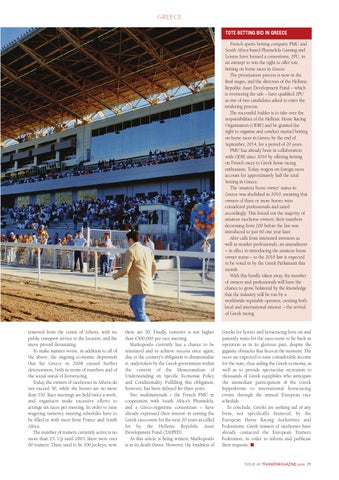EUROPEAN TRAINER GREECE ISSUE 45_Jerkins feature.qxd 28/03/2014 07:46 Page 2
GREECE TOTE BETTING BID IN GREECE French sports betting company PMU and South Africa-based Phumelela Gaming and Leisure have formed a consortium, 2PU, in an attempt to win the right to offer tote betting on horse races in Greece. The privatisation process is now in the final stages, and the directors of the Hellenic Republic Asset Development Fund – which is overseeing the sale – have qualified 2PU as one of two candidates asked to enter the tendering process. The successful bidder is to take over the responsibilities of the Hellenic Horse Racing Organisation (ODIE) and be granted the right to organise and conduct mutuel betting on horse races in Greece by the end of September, 2014, for a period of 20 years. PMU has already been in collaboration with ODIE since 2010 by offering betting on French races to Greek horse racing enthusiasts. Today, wagers on foreign races account for approximately half the total betting in Greece. The ‘amateur horse owner’ status in Greece was abolished in 2010, meaning that owners of three or more horses were considered professionals and taxed accordingly. This forced out the majority of amateur racehorse owners, their numbers decreasing from 200 before the law was introduced to just 60 one year later. After calls from interested investors as well as market professionals, an amendment – in effect re-introducing the amateur horse owner status – to the 2010 law is expected to be voted in by the Greek Parliament this month. With this hurdle taken away, the number of owners and professionals will have the chance to grow, bolstered by the knowledge that the industry will be run by a worldwide-reputable operator, creating both local and international interest – the revival of Greek racing.
removed from the centre of Athens, with no public transport service to the location, and the move proved devastating. To make matters worse, in addition to all of the above, the ongoing economic depression that hit Greece in 2008 caused further deterioration, both in terms of numbers and of the social status of horseracing. Today, the owners of racehorses in Athens do not exceed 50, while the horses are no more than 350. Race meetings are held twice a week, and organisers make excessive efforts to arrange six races per meeting. In order to raise wagering turnover, meeting schedules have to be filled in with races from France and South Africa. The number of trainers currently active is no more than 25. Up until 2003, there were over 60 trainers. There used to be 100 jockeys; now,
there are 30. Finally, turnover is not higher than €300,000 per race meeting. Markopoulo currently has a chance to be reinstated and to achieve success once again, due to the country's obligation to denationalise it, undertaken by the Greek government within the context of the Memorandum of Understanding on Specific Economic Policy and Conditionality. Fulfilling this obligation, however, has been delayed for three years. Two multinationals – the French PMU in cooperation with South Africa's Phumelela, and a Greco-Argentine consortium – have already expressed their interest in renting the Greek racecourse for the next 20 years as called for by the Hellenic Republic Asset Development Fund (TAIPED). As this article is being written, Markopoulo is in its death throes. However, the fondness of
Greeks for horses and horseracing lives on and patiently waits for the racecourse to be back in operation as in its glorious past, despite the gigantic obstacles that faces at the moment. The races are expected to raise considerable income for the state, thus aiding the Greek economy, as well as to provide spectacular recreation to thousands of Greek equiphiles who anticipate the immediate participation of the Greek hippodrome to international horseracing events through the annual European race schedule. To conclude, Greeks are seeking aid of any form, not specifically financial, by the European Horse Racing Authorities and Federations. Greek trainers of racehorses have already contacted the European Trainers Federation, in order to inform and publicise their requests. n
ISSUE 45 TRAINERMAGAZINE.com 71
